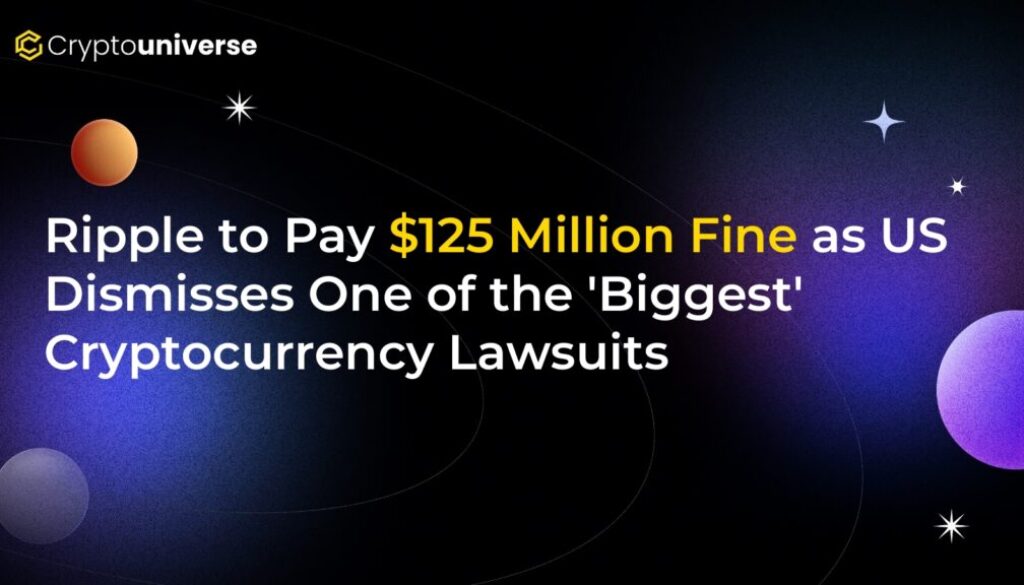Ripple to Pay $125 Million Fine as US Dismisses One of the ‘Biggest’ Cryptocurrency Lawsuits

A Landmark Legal Saga Reaches Its Conclusion
In a watershed moment for the cryptocurrency industry, the long and arduous legal battle between Ripple Labs and the U.S. Securities and Exchange Commission (SEC) has finally come to an end. Ripple has agreed to a settlement, concluding a lawsuit that has captivated and concerned the digital asset space for years. The resolution involves Ripple paying a $125 million penalty, a figure significantly lower than the SEC’s initial demands, marking what many see as a strategic victory for the blockchain company and a pivotal step towards regulatory clarity in the United States.
This conclusion puts an end to years of uncertainty that have loomed over Ripple and its native digital asset, XRP. Let’s break down what this settlement means and its ripple effect across the entire crypto ecosystem.
The Heart of the Dispute: Was XRP a Security?
The saga began in December 2020 when the SEC filed a lawsuit against Ripple Labs and two of its executives, CEO Brad Garlinghouse and co-founder Chris Larsen. The core allegation was that Ripple had conducted a $1.3 billion unregistered securities offering through its sales of the XRP token.
The SEC argued that investors who purchased XRP were essentially investing in a common enterprise with the expectation of profit from Ripple’s efforts, the classic definition of a security under the Howey Test. Ripple, however, vehemently denied these claims, maintaining that XRP was a digital currency used to facilitate fast and low-cost international payments, not an investment contract.
Breaking Down the Settlement and the Road to Resolution
The final agreement sees Ripple paying a <$125 million fine> to settle the charges. While a substantial amount, it’s a stark contrast to the nearly $2 billion in disgorgement and penalties the SEC was originally seeking. More importantly, as part of this resolution, the SEC has agreed to dismiss its charges against Garlinghouse and Larsen, a significant win for the company’s leadership.
A key turning point in the case came in July 2023, when Judge Analisa Torres delivered a landmark summary judgment that provided a nuanced view:
- Institutional Sales: The judge ruled that Ripple’s direct sales of XRP to institutional investors did constitute unregistered securities offerings.
- Programmatic Sales: Crucially, she ruled that Ripple’s sales of XRP on public crypto exchanges to retail buyers did not qualify as securities transactions.
This split decision was hailed as a major victory for Ripple and the broader crypto market. It created a legal distinction that many other digital asset projects could potentially leverage, suggesting that the nature of a token’s sale, not just the token itself, determines its classification.
Why This Settlement is a Game-Changer for Crypto
The conclusion of the SEC vs. Ripple lawsuit is more than just a headline; it carries profound implications for the entire digital asset industry in the U.S. and beyond.
1. A Step Towards Regulatory Clarity
For years, the crypto industry has operated in a gray area, plagued by the question of which digital assets are commodities and which are securities. While this settlement doesn’t create a new law, it reinforces Judge Torres’s precedent-setting ruling, providing a clearer, albeit court-derived, framework for other crypto projects.
2. A Boost for Ripple’s Operations
With this legal cloud lifted, Ripple can now operate with far greater confidence, particularly within the United States. The company can more easily forge partnerships with banks and financial institutions for its On-Demand Liquidity (ODL) service, which uses XRP as a bridge currency. Many U.S.-based partners had paused or severed ties with Ripple when the lawsuit was first filed.
3. Impact on the XRP Market
The end of the lawsuit is expected to bring positive sentiment to the XRP token. The legal uncertainty has long been cited as a primary factor suppressing its price. With the case resolved, exchanges that delisted XRP may consider relisting it, potentially increasing its liquidity and accessibility to a wider range of investors.
What’s Next for Crypto Regulation?
While the Ripple settlement is a significant milestone, the fight for comprehensive and clear crypto regulation in the United States is far from over. This case highlights the inadequacy of applying decades-old securities laws to a novel technology like blockchain. The industry will continue to advocate for new legislation tailored to the unique characteristics of digital assets.
Ultimately, the resolution of one of the ‘biggest’ cryptocurrency lawsuits is a moment of relief and cautious optimism. It closes a contentious chapter and allows the industry to move forward with a little more clarity and a powerful legal precedent in its corner.


